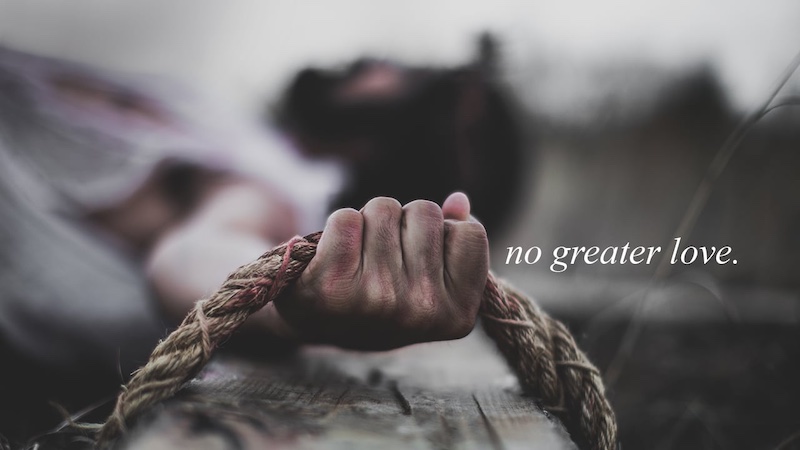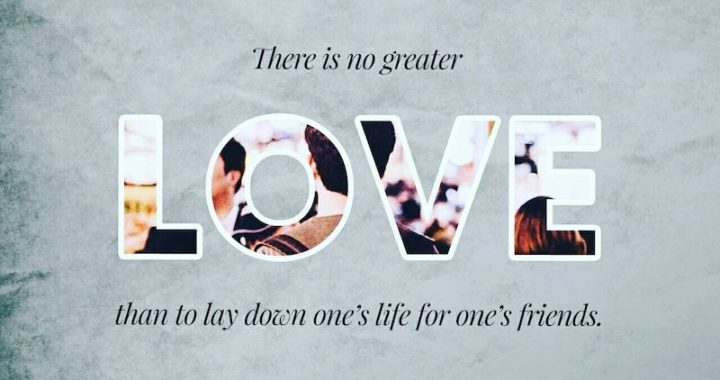What does God’s love look like?
As a child, love was something distant and foreign to me personally. I never heard my parents say the words “I love you” to each other nor do I remember hearing those words expressed to me by them. I came to realize later as an adult that it was not that my parents did not love me or my sisters but that they did not know how to express those words to us when we were children. They were from a generation known as “the silent generation” which was not emotionally expressive. This being true, the concept of love was further marred by my parents separation and divorce when I was a teenager.
Because of the absence of love in our home, the concept and meaning of love was formulated for me by my peers, the popular music of the 1980s, and Hollywood movies. Love was presented to me through these mediums as a mystical concept between a man and a woman that was manifested in seeking physical pleasure. For me personally, the concept of biblical love or love ordained by God was lost in a tainted world of confusion.
Thankfully, God did not leave me in this lost state but placed several individuals across my path to show me that there was a higher love beyond the broken picture that I had been shown in this world. God’s love broke into my life at the latter end of my teenage years and His love helped me to view the world through a new set of eyes. Life experiences have a way of shaping and molding our understanding of love, however, God’s truth is able to break through the lies and deception of this world in order to show us love from a pure heart and right motivation. In this week’s Torah Portion reading we see God’s love illustrated in a very powerful manner.
Joseph & His Brothers
The story of Joseph and his brothers reveals a series of situations and encounters that are so well orchestrated that it is impossible to not see the clear hand of God at each turn of the story. In this week’s reading, which begins in Genesis 44:18, Jospeh had his brothers in the exact place where he wanted them to be, at his mercy. The dreams that God had given Joseph were coming to fulfillment as Joseph’s brothers came into his presence and bowed down before him (Gen. 44:14).
Joseph’s special wine goblet had been found in Benjamin’s sack, having been placed there by Joseph’s servant, and it seems that Jospeh was hoping to keep his younger brother with him while sending his other brothers back to their father:
So Judah said, “What can we say to my lord? What can we speak? And how can we justify ourselves? God has found out the iniquity of your servants; behold, we are my lord’s slaves, both we and the one in whose possession the cup has been found.” But he said, “Far be it from me to do this. The man in whose possession the cup has been found, he shall be my slave; but as for you, go up in peace to your father.” – Genesis 44:16-17
Joseph’s authority was supreme in the land and his word was final. Joseph made the rules and his brothers had no choice but to submit to the lord of the land of Egypt.
A True Leader
Benjamin’s life hung in the balance: he would either be taken by Joseph as a slave in Egypt in order to remain with his brother or he would be set free to return to their father in the land of Canaan. Their father, Jacob, had told his sons that if they did not bring Benjamin back to him from Egypt than his life would have no meaning (Gen. 42:38).
It is at this moment in the story that Judah made a bold move to speak to Joseph and plead for the life of Benjamin:
Then Judah approached him, and said, “Oh my lord, may your servant please speak a word in my lord’s ears, and do not be angry with your servant; for you are equal to Pharaoh. – Gen. 44:18
It was Judah who had persuaded his father to let Benjamin travel with them to Egypt. Since Judah had given his word to their father to return Benjamin to him, he had to do everything in his power to make this happen.
Life For Life
Judah’s bold appeal to Joseph on behalf of their youngest brother Benjamin includes a full recounting of the events that had transpired ever since they first came face to face with Joseph, their disguised brother and ruler of Egypt. Judah then concluded his argument with a simple yet profound statement that literally broke Joseph:
Now, therefore, when I come to your servant my father, and the lad is not with us, since his life is bound up in the lad’s life, when he sees that the lad is not with us, he will die. Thus your servants will bring the gray hair of your servant our father down to Sheol in sorrow. For your servant became surety for the lad to my father, saying, ‘If I do not bring him back to you, then let me bear the blame before my father forever.’ Now, therefore, please let your servant remain instead of the lad a slave to my lord, and let the lad go up with his brothers. For how shall I go up to my father if the lad is not with me—for fear that I see the evil that would overtake my father?” – Gen. 44:30-34
Judah’s argument was straightforward, saying in essence: “For the sake of the life of my father, let me take the place of Benjamin and let Benjamin return to his father!”
Since Judah did not realize that he was talking with his brother Joseph, he had no idea how his words would have such a dramatic effect on the ruler of the land of Egypt:
Then Joseph could not control himself before all those who stood by him, and he cried, “Have everyone go out from me.” So there was no man with him when Joseph made himself known to his brothers. – Gen. 45:1
Joseph had been acting a part to keep his identity hidden from his brothers but there was something in Judah’s words that caused him to lose control and to reveal his true identity to his brothers. Joseph was broken by true love.
It was not a persuasive argument that broke Joseph nor was it Judah’s simple appeal for mercy on behalf of an aging father but rather, Judah’s substitutionary act of pledging his own life for the sake of his brother Benjamin. This act showed Joseph a godly love that he never dreamed possible, especially from his own family and from one of the very brothers who betrayed him. Judah not only said that he had pledged his life on behalf of his brother Benjamin but he literally proved his commitment to give his own life for Benjamin. Judah’s act of sacrificial love brought reconciliation in the family and united the brothers as never before.

No Greater Love
True love expressed through real sacrifice is the manifestation of God’s love on this earth. Very rarely do we see the love of God expressed in this manner, however when it is lived out, it changes lives and changes the world in which we live. I believe that this is what Yeshua meant when He spoke these words to His disciples:
This is My commandment, that you love one another, just as I have loved you. Greater love has no one than this, that one lay down his life for his friends. – John 15:12-13
Yeshua commanded His disciples to love one another and then explained that the greatest love is revealed through sacrifice, giving one’s life for the sake of another. Judah illustrated this type of sacrificial love by being willing to take Benjamin’s place in order that he could go free.
Our words and our deeds must go hand in hand. True love is expressed through real actions and the greatest love is expressed through real sacrifice. Judah’s act of sacrificial love brought a broken family back together by uniting brothers and rejoining them to their father. Yeshua’s act of sacrificial love has given a broken world the opportunity to be reunited with the Father in heaven in perfect unity and the ability to love one another in a holy and pure love.
Shabbat Shalom!
If you enjoyed reading this article, share it today with friends! We also invite you to sign up for our weekly Torah Portion commentary on the sidebar to the right.
Help keep our weekly commentaries free and available to all. Click here to donate today:
*All Scripture take from NASB Copyright © 1960, 1962, 1963, 1968, 1971, 1972, 1973, 1975, 1977, 1995 by The Lockman Foundation
Torah Portion: Gen. 44:18-47:27
Haftara: Ezekiel 37:15-28
Return to Torah Portion Homepage
Copyright Jewels of Judaism. All rights reserved 2020


